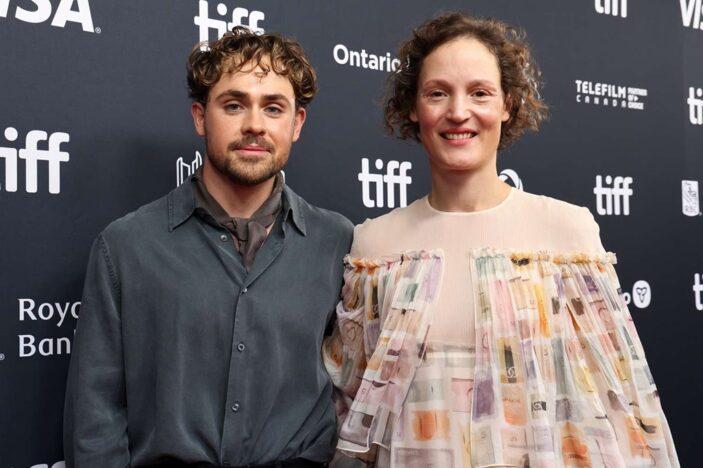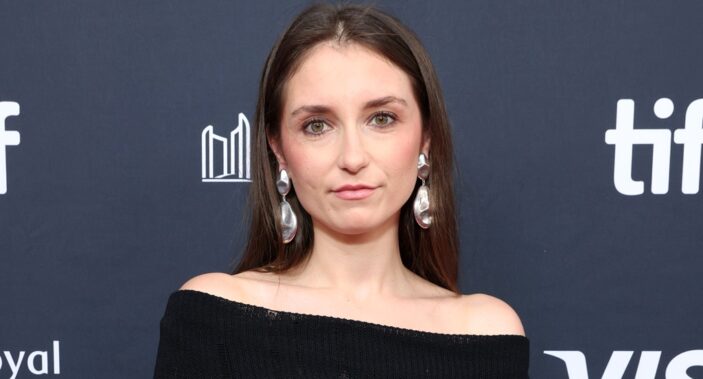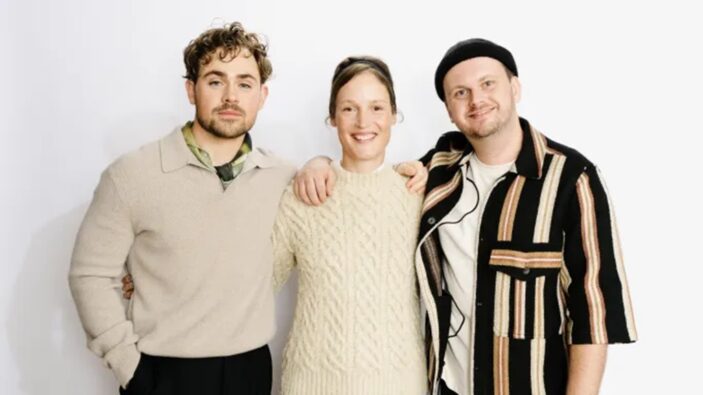
Jack (Dacre Montgomery) travels to a remote region of New Zealand to attend the wake of his estranged mother Elizabeth, a troubled architect who abandoned him as a child. Jack claims he was invited to the funeral by his mother’s widow, Jill (Vicky Krieps), who has no recollection of contacting him.
Out of a sense of obligation to her late wife, Jill invites Jack to stay at their house until the funeral, intrigued, as he is, for them to learn more about each other. As Jack grapples with his complex emotions about his mother and the boyfriend he has left behind, his encounters with Jill begin as terse and sometimes tense affairs. Their lives are soon upended further when Elizabeth’s spectral presence makes itself known, inhabiting each of their bodies in turn but leaving no memories of what was said — or done — during the possessions.
Elizabeth’s spirit causes chaos, confusion, and fractures for Jack and Jill. As they struggle to make sense of her intentions, her interventions begin to take ever darker and more sinister turns. Director Samuel Van Grinsven and co-writer Jory Anast draft a brooding and deeply atmospheric story that explores the legacy of loss, grief, and abuse through tremendous performances from its two leads, set amid New Zealand’s breathtaking South Island. Went Up The Hill is that exciting gem: a beautiful, intimate, and original ghost story.
As the cast and crew walked the red carpet at the film’s premiere at the Toronto International Film Festival, Peter Gray was there to talk to the collective about the imagery that informed the film’s inception, how they navigate collaboration, and the personal influences they individually infuse into their work.
Jory, when it comes to you and Samuel collaborating on the script, how does that necessarily come together? Are you both forming your own ideas and then coming together? Or is everything a joint effort?
Jory Anast: Everything Sam and I do is side by side. The way it starts is always Sam has a vision in his head. In this case it was an image, and it was an image of a boy walking up a mountain towards an abandoned house. And we just build it out from there, and he’s so brilliant at tone and emotion, and I come in with a lot of structural work, and together we find this lingering tone. And everything we do together, whether that’s in person or over Zoom, there is not a word that doesn’t go on the page that’s independent from one another. Even down to the placement of a comma is debated on (laughs). It can take some time to finish a screenplay, but it’s worth it.
There’s a ghostly element to this story. How was that for you in finding that balance of emotional resonance and the more haunting aspects of the story?
Jory Anast: That’s such a good question. I think it can be quite a hard thing to balance, but where Sam and I’s strength lies is that in every creative decision we make is always born from character motivation. Therefore those real trope elements don’t feel undeserved. They don’t feel forced. They come from the emotion. I think that allows it to breathe quite freely in the film. At least I hope.
With modern audiences seemingly wanting everything so quickly, do you find in any way that you write in a manner that looks to cater to younger audiences? Or is it always about the film finding the audience it deserves organically?
Jory Anast: You mentioned Sequin in a Blue Room (in our pre-chat), and it’s so funny you mentioned that because Sam and I make these movies for us. We’re the audience. The world is so big. So, if we exist, there’s someone else out there that exists, and that’s who we’re making the film for. If an audience wants to come along and watch our movies, that’s the cherry on top. But it is a valid question, and it’s something to think about, but it can be a bit of a trap if you start thinking too much about the audience in the theatre. I think it can be quite paralyzing.

Sam, as Jory mentioned that this film came from a singular image. When you start writing, do you ever find that you start drifting further from that image? And it’s a conscious effort to maintain your original idea?
Samuel Van Grinsen: I think so. Even as a writer, and this is one of the reasons I love writing with Jory, I’m very visual. I’m very lucky that I know I’m writing something that I get to direct. I really just embrace the visual part of it. That first image that I had, that turned into a scene about seven minutes into the film, Dacre and Vicky’s first shared scene together. Yes, it was the original image, but it grows from there. I just let it continually grow, and in the writing process you adapt to feedback. You know, Vicky and Dacre have such ownership of these characters and they have such incredible instincts as performers. You have to make the film that’s in front of you, and not the film on the page.
Vicky, how did you find visiting New Zealand for the first time and filming there?
Vicky Krieps: I loved the script, but one of the reasons (to do this film) was to go to New Zealand. It was even more mind-blowing than I thought. What was very impressive (were) the people. Everyone is so nice and straightforward, and just good human beings. What was weird, as someone from the opposite side of the world, was arriving and just feeling weird. I didn’t know why I felt that way. It wasn’t the jetlag. And then suddenly it struck me. It’s because it looks like it’s the UK. I feel like I’m just outside of London. But I travelled so far and my mind and my soul just subconsciously expect a jungle. It’s like when you go to Africa, you go to Africa. Even though there’s colonization, you know? But in New Zealand, it’s like they completely transformed it (laughs). That was really weird to understand.
I know in the film you and Dacre inhabit the same character in some ways. Did the two of you collaborate together in informing that performance so that it feels cohesive?
Vicky Krieps: I find it very difficult to talk about what we did together. It’s very much what you said, we informed each other. Not necessarily in the sense of “Who’s this?” That’s agreeing on something, and we agreed to not agree. We wanted to meet in the middle. We did this thing together, and we didn’t know the other did it, we have the same process of choosing perfume for the character. I had bought a perfume for (my character) Jill and (the joint character) Elizabeth, and he had bought one for (his character) Jack, and then we shared the perfume for Elizabeth. A lot of it was about the scent. It felt like we were holding our breath for the entire shoot. We didn’t hang out, we didn’t have fun, we didn’t speak, but (Dacre and I) we like each other, but there was just no space for that.
Dacre Montgomery: With Elizabeth, there’s no costume change and we didn’t want to do a caricature (performance), so we really used that perfume to inform us as to who Elizabeth is. You can smell who she is. Scent is so sensory, so that was the main thing for us.

Dacre, do you find that because of Stranger Things, you’re purposely seeking out material that’s so vastly opposite from the genre offers you may be receiving?
Dacre Montgomery: Oh, totally. Stranger Things has opened up an incredible platform for me. Like, I wouldn’t have even been on the list for Went Up The Hill if I didn’t have Stranger Things. But I have largely taken the last 5-or-so years off, and that was not necessarily due to ST (Stranger Things), it was because I just want to find the type of movie I want to act in. If I never do anything again after Went Up The Hill…
I feel confident in saying you’ll be fine.
Dacre Montgomery: (Laughs) You never know though. I’m really good at making coffee, so…
Is there a necessity for you in placing between Australian and international productions?
Dacre Montgomery: I have always wanted to star in an Australian film for so long. And even though (my character) Jack is born in New Zealand, he moved to Australia when he was young, he’s from Sydney in the script, and I’ve never played an Australian character before. To speak in an Australian accent was actually scary. I suddenly had this imposter syndrome. Am I only an OK actor when I’m playing an American? So that’s something I had to wrestle with. I’m about to direct my first film next year, and the plan is shoot in Queensland and New South Wales. And Jory has written the script. So, hopefully I’ve answered your question, but I am definitely trying to segue back to Australia to direct. There’s an incredible amount of autonomy in directing.
Went Up The Hill is screening as part of this year’s Toronto International Film Festival, running between September 5th and 15th, 2024. For more information about the festival, head to the official site here.
